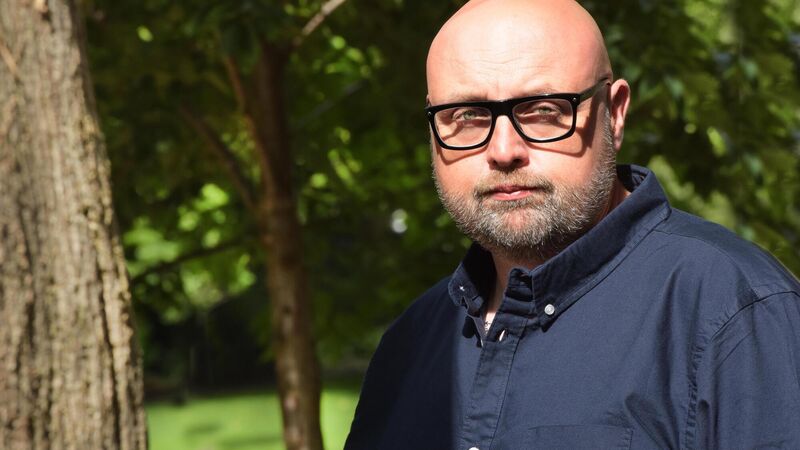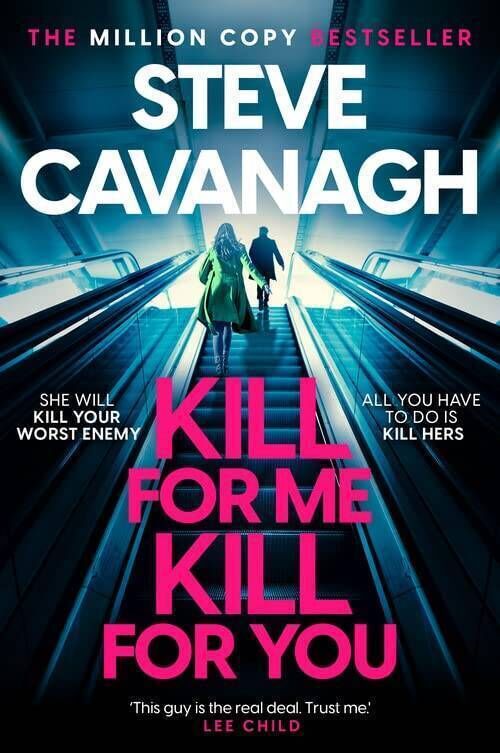Book Interview: Crime writer Steve Cavanagh on the nature of revenge

Steve Cavanagh, author. Photograph: Moya Nolan
- Kill For Me, Kill For You
- Steve Cavanagh
- Headline, €14.99
Crime writer Steve Cavanagh is an international bestseller and a master of suspense in his own right yet he regularly refers — and defers — to the skilled practitioners who went before him. Alfred Hitchcock, for example, is a firm favourite. “Nobody does it quite like him,” he says, explaining the inspiration for his ninth book.
, a standalone novel, reworks the central premise of the great director’s 1951 film : two people, both bent on revenge, meet by chance and hatch a plan to swap murders to avoid detection.
Cavanagh goes further than the film (and the eponymous Patricia Highsmith novel on which it is based) to deliver an utterly compelling study of the corrosive nature of revenge. The Walter Scott quote in the book’s opening pages gives a tantalising hint of what’s to come: “Revenge, the sweetest morsel to the mouth that ever was cooked in hell.” Expect a twisting, turning slalom course that whisks you through a 120,000-word book as if it were a pamphlet. It is utterly propulsive and, in common with all crime novels, it has a significant body count — and violence. Cavanagh, though, is very careful about the way he writes violence.
Again, he returns to Hitchcock and recalls the famous shower scene in where violence and nudity, both famously criticised by the censors, were implied rather than shown. A series of flashing images — a knife blade in silhouette, a river of liquid (chocolate sauce) — are set to a soundtrack of shrieking violins; the viewer’s imagination does the rest.
Like Hitchcock, Steve Cavanagh says he leaves his readers to fill in the gruesome details: “I describe the aftermath. The reader does the work for me. You will never see the knife going in. I’m much more interested in the blood going down the plughole.”
And he will never show violence against a vulnerable person, a child or a woman, he says. “If there is violence against women, it has happened in the past. People who write those kind of books; that is OK for them, but I never want to see it.”
He tries not to sensationalise violence, rather show that it is frightening, messy and leaves a trail of devastation in its wake. “Too often [in the past], fiction turned what was very real female trauma into hysteria and made the whole terrible crime about the man. It became all about the male gaze and toxic masculinity.”
His book, he hopes, is more psychologically complex and shows what revenge does to people. “The flip side of [revenge] is that there are people who don’t get justice. Terrible things happen to them, or their families, and they don’t get justice. Some people can deal with it and some people can’t, and this book explores what happens when people can’t deal with that. They take the law into their own hands and look for revenge.”
Steve Cavanagh knows more than most about the law and justice. He worked for many years as a solicitor in Belfast and Co Down under his real name Stephen Mearns, earning a reputation for his civil rights work.
In 2010, he was part of the legal team which secured a record award (£53,000/€61,800) for a Croatian man who suffered racist bullying in the workplace. Mearns also successfully fought cases for a woman fired from her job while pregnant and another discriminated against because of disability.
Much has been said about his haphazard entry into that career. He apparently signed up to do law because, a little hungover, he was swept along by the crowd into the wrong registration queue at Portobello Institute in Dublin. The account is exaggerated, he says, but he did get into the profession by accident.
His love of crime fiction, though, was much more deliberate. His mother Bridie, a thriller fan, gave him a copy of by Thomas Harris at the age of 12 or 13. “It was light relief, I loved it,” he says.

Reading books, he says, provided a bit of escapism from the violence that was an all-too-common feature of his childhood growing up in Belfast in the 1980s and 1990s.
If his mother sparked his interest, she also inspired him to start writing. When she died suddenly in 2011, he decided to try to write. He also took her maiden name, Cavanagh, as a tribute to her but also to distinguish Steve, the thriller writer from Stephen, the lawyer.
His first book, , came out to critical acclaim in 2015. For a while, Stephen worked by day while Steve wrote late into the night but in 2019, the writer won out. Steve Cavanagh has written full-time since then and has never looked back.
“I don’t miss it [law]. I did my time. It was a very tough and demanding job, and it was very hard to do both.”
His former life, though, makes its way into his books. “I’m a recovering lawyer,” he says. “In some of my books, I will touch on various injustices, real things that happen in the world, but they are rarely the driver for the main story.”
In 2015, his novella was inspired by the death of Eric Garner, a 43-year-old African American father of six, who was strangled to death by the New York police after he was found illegally selling cigarettes. “That prompted me to look into the history of the NYPD and chokeholds because I wanted to cross-examine those senior police officers. This was years before George Floyd.”
In the , the death penalty comes into focus as his familiar ex-conman-turned-trial-attorney Eddie Flynn makes the same journey to Alabama as Steve Cavanagh himself made in real life. The writer recalls what looked like mist on the field, but it was cotton. “It was quite eerie and ethereal, especially in the [historical] context of that. I’m not going back to Alabama.”
The memory of it prompts Cavanagh to deliver an eloquent summary of the reasons why the death penalty is unjustified. In brief, the death penalty is delivered by personalities rather than politics; it doesn’t make financial sense and it is not a deterrent.
Corruption is also a big theme in his books. “I feel passionate about that. Maybe that comes from a Northern Ireland upbringing.”
In essence, though, Steve Cavanagh writes because he wants to entertain people: “I hope people who read my books get enjoyment or a bit of relief, or a laugh or a fright. And yes, sometimes, a fright is as good as a laugh.”
The first step in every book is discussing a germ of an idea with his wife Treacy. Then he starts writing; in his home office, in cafés and libraries. He journals too, making notes about the characters.
Steve Cavanagh’s advice to would-be authors — “read a lot, write a lot” — is advice he follows himself. He reads crime fiction, thrillers, fantasy and literary novels and lots of books on writing because he always wants to better his craft.
“The plan is to write a better book every year,” he says. Next year, Eddie Flynn will be back, featuring in the eighth book in the series.
It’s been quite a journey since 2015. Steve Cavanagh’s books have been read by millions, translated into over 30 languages and garlanded with several awards. He still can’t quite believe that the only non-native author to sell more books than him in Germany last year was Colleen Hoover.
“That just amazes me,” he says, but he’s taking nothing for granted. “I regularly pinch myself, but I’m really down to earth because I know it can all go away very quickly.” Not anytime soon.






